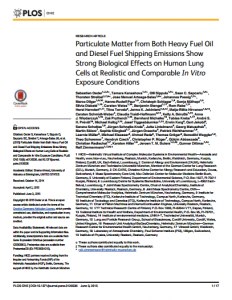Full Title: Particulate Matter from Both Heavy Fuel Oil and Diesel Fuel Shipping Emissions Show Strong Biological Effects on Human Lung Cells at Realistic and Comparable In Vitro Exposure Conditions
Author(s): Oeder S, Kanashova T, Sippula O, Sapcariu SC, Streibel T, Arteaga-Salas JM, et al.
Publisher(s): PLOS One
Publication Date: June 1, 2015
Full Text: Download Resource
Description (excerpt):
Ship engine emissions are important with regard to lung and cardiovascular diseases especially in coastal regions worldwide. Known cellular responses to combustion particles include oxidative stress and inflammatory signalling.
The HFO emissions contained high concentrations of toxic compounds such as metals and polycyclic aromatic hydrocarbon, and were higher in particle mass. These compounds were lower in DF emissions, which in turn had higher concentrations of elemental carbon (“soot”). Common cellular reactions included cellular stress responses and endocytosis. Reactions to HFO emissions were dominated by oxidative stress and inflammatory responses, whereas DF emissions induced generally a broader biological response than HFO emissions and affected essential cellular pathways such as energy metabolism, protein synthesis, and chromatin modification.
Despite a lower content of known toxic compounds, combustion particles from the clean shipping fuel DF influenced several essential pathways of lung cell metabolism more strongly than particles from the unrefined fuel HFO. This might be attributable to a higher soot content in DF. Thus the role of diesel soot, which is a known carcinogen in acute air pollution-induced health effects should be further investigated. For the use of HFO and DF we recommend a reduction of carbonaceous soot in the ship emissions by implementation of filtration devices.
